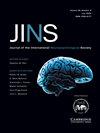国际测验委员会《测验翻译和改编准则》在神经心理学方面的应用
IF 2.6
4区 心理学
Q2 CLINICAL NEUROLOGY
Journal of the International Neuropsychological Society
Pub Date : 2024-09-18
DOI:10.1017/s1355617724000286
引用次数: 0
摘要
目的:在过去二十年里,测试翻译和改编的数量呈指数级增长,这些过程现已成为一种普遍做法。国际测验委员会(ITC)《测验翻译和改编指南》(2017 年第二版)提供了确保翻译和改编测验质量的原则和实践。然而,这些准则并不针对临床神经心理学测量所检查的认知过程。本出版物旨在提供一套专门的建议,用于指导神经心理学测验的翻译和改编程序。方法:国际神经心理学会文化神经心理学特别兴趣小组(Cultural Neuropsychology Special Interest Group)成立了一个工作组,其任务是扩展 ITC 指南,为神经心理学测验的翻译/改编提供专门的建议。代表十多个国家的作者们参考了有关神经心理学测验翻译、改编和开发的文献,以及他们自己的专业知识,并咨询了该领域经验丰富的同事,最终制定了神经心理学应用 ITC 指南。结果:本文概述了有关 ITC 测验翻译和改编指南的神经心理学评论。此外,还提供了在各种标准中应用这些建议的实例,以帮助测验开发人员获得有效、可靠的结果。结论:制定具体的神经心理学测验翻译和改编指南对于确保此类过程产生可靠有效的心理测量结果至关重要。鉴于过去二十年来神经心理学在全球范围内的快速发展,这些建议可以帮助研究人员和从业人员开展此类工作。本文章由计算机程序翻译,如有差异,请以英文原文为准。
Neuropsychological application of the International Test Commission Guidelines for Translation and Adapting of Tests
Objective: The number of test translations and adaptations has risen exponentially over the last two decades, and these processes are now becoming a common practice. The International Test Commission (ITC) Guidelines for Translating and Adapting Tests (Second Edition, 2017) offer principles and practices to ensure the quality of translated and adapted tests. However, they are not specific to the cognitive processes examined with clinical neuropsychological measures. The aim of this publication is to provide a specialized set of recommendations for guiding neuropsychological test translation and adaptation procedures. Methods: The International Neuropsychological Society’s Cultural Neuropsychology Special Interest Group established a working group tasked with extending the ITC guidelines to offer specialized recommendations for translating/adapting neuropsychological tests. The neuropsychological application of the ITC guidelines was formulated by authors representing over ten nations, drawing upon literature concerning neuropsychological test translation, adaptation, and development, as well as their own expertise and consulting colleagues experienced in this field. Results: A summary of neuropsychological-specific commentary regarding the ITC test translation and adaptation guidelines is presented. Additionally, examples of applying these recommendations across a broad range of criteria are provided to aid test developers in attaining valid and reliable outcomes. Conclusions: Establishing specific neuropsychological test translation and adaptation guidelines is critical to ensure that such processes produce reliable and valid psychometric measures. Given the rapid global growth experienced in neuropsychology over the last two decades, the recommendations may assist researchers and practitioners in carrying out such endeavors.
求助全文
通过发布文献求助,成功后即可免费获取论文全文。
去求助
来源期刊
CiteScore
5.40
自引率
3.80%
发文量
185
审稿时长
4-8 weeks
期刊介绍:
The Journal of the International Neuropsychological Society is the official journal of the International Neuropsychological Society, an organization of over 4,500 international members from a variety of disciplines. The Journal of the International Neuropsychological Society welcomes original, creative, high quality research papers covering all areas of neuropsychology. The focus of articles may be primarily experimental, applied, or clinical. Contributions will broadly reflect the interest of all areas of neuropsychology, including but not limited to: development of cognitive processes, brain-behavior relationships, adult and pediatric neuropsychology, neurobehavioral syndromes (such as aphasia or apraxia), and the interfaces of neuropsychology with related areas such as behavioral neurology, neuropsychiatry, genetics, and cognitive neuroscience. Papers that utilize behavioral, neuroimaging, and electrophysiological measures are appropriate.
To assure maximum flexibility and to promote diverse mechanisms of scholarly communication, the following formats are available in addition to a Regular Research Article: Brief Communication is a shorter research article; Rapid Communication is intended for "fast breaking" new work that does not yet justify a full length article and is placed on a fast review track; Case Report is a theoretically important and unique case study; Critical Review and Short Review are thoughtful considerations of topics of importance to neuropsychology and include meta-analyses; Dialogue provides a forum for publishing two distinct positions on controversial issues in a point-counterpoint format; Special Issue and Special Section consist of several articles linked thematically; Letter to the Editor responds to recent articles published in the Journal of the International Neuropsychological Society; and Book Review, which is considered but is no longer solicited.

 求助内容:
求助内容: 应助结果提醒方式:
应助结果提醒方式:


